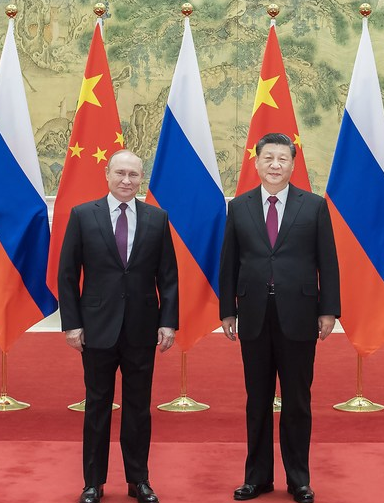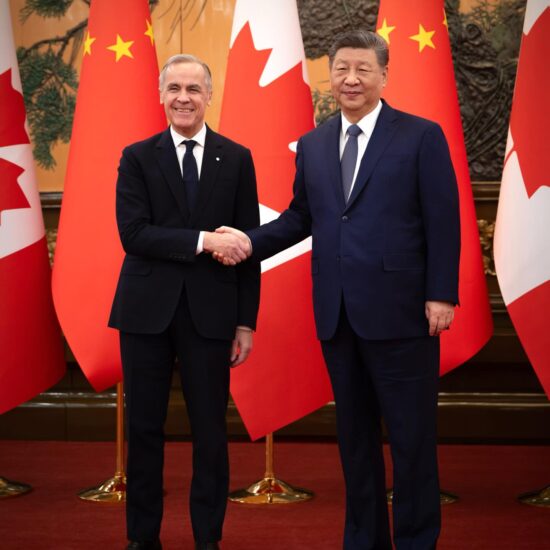
Bob Mackin
It took a war for Canadian telecoms to drop a Russian government propaganda outlet from their channel menus.
But a human rights group that advocates for journalists and lawyers in China is hoping that the federal regulator will end the authorization for two channels acting as Chinese Communist Party mouthpieces.

Meng Wanzhou at Russia Calling 2014 with President Vladimir Putin (RT)
Bell, Rogers, Shaw and Telus each voluntarily pulled the English-language RT America after Russia invaded Ukraine. On March 1, Heritage Minister Pablo Rodriguez commended them and said that the Liberal government is asking the Canadian Radio-television Telecommunications Commission to fast-track a hearing process that could ban RT for good. “Disinformation has no place on Canadian airwaves,” Rodriguez Tweeted.
CRTC spokeswoman Isabella Maestri said the agency has received complaints from citizens about 2005-launched RT. The channel is still available via live streaming services and on its own website.
Safeguard Defenders’ campaign director Laura Harth called RT’s removal by Canadian telecoms “a very interesting development to see, especially in this time of information warfare” when authoritarian regimes are using modern media to spread disinformation and enforce their image in democratic countries.
“We hope that the same will go with regard to China, we hope that the lesson we can learn from the atrocities happening now in Ukraine,” Harth said in an interview from Rome.
Safeguard Defenders complained to the CRTC in December 2019 about Mandarin language CCTV-4 and English language CGTN with evidence they aired dozens of forced confessions of prisoners from 2013 to 2019. It called the content abusive and harmful, and “typical of CCTV’s mode of operation and broadcast.”

Swedish human rights activist Peter Dahlin in a 2016 forced, false confession (CCTV)
Founder Peter Dahlin was himself detained for 23 days on trumped-up charges of endangering national security in early 2016 while running the China Action NGO. The Swede was released after a forced, false confession on state TV.
In January, Safeguard Defenders learned that the CRTC had demanded state parent company China International Communications Co., explain why CCTV-4 and CGTN should remain available on Canadian TV. A letter provided by the CRTC media relations office showed secretary general Claude Doucet threatened removal from the list of non-Canadian programming services authorized for distribution.
“If the allegations contained in Safeguard Defenders’ complaint are true, the distribution of such content in Canada is antithetical to the policy objectives of the [Broadcasting] Act and does not serve the public interest in any way,” Doucet wrote.
The services qualified for carriage in Canada in 2006 and 2012, respectively. In his letter, Doucet reminded CCTV-4 that when it was authorized, “the Commission made it clear that removal of a non-Canadian service from the list is a remedy that it will be prepared to exercise should content aired on the service be contrary to Canadian broadcasting policy.”
Maestri said that the Beijing company was granted a two-month extension from the original Jan. 31 deadline, but “have not yet replied in a substantive manner.”
In the U.K., regulator Ofcom ruled in early 2021 in favour of Safeguard Defenders and withdrew CGTN’s licence. It also issued issued £450,000 (or CAD$763,000) in fines for multiple violations.
Bell was the only telecom to respond to a query, but it only did so to confirm that it had withdrawn RT on Feb. 27. It did not answer questions about CCTV-4 and CGTN.
Harth said that with RT gone from the Canadian telecoms, there is a concern that the Chinese government services will act as proxies for Russia’s government. “They have a strategic alliance and marriage of convenience,” she said.
Some of CCTV-4’s programming airs elsewhere, such as the CCTV China World News twice-daily on the Shaw Multicultural Channel. The channel also carries newscasts from Taiwan’s FTV, The Epoch Times Hong Kong Express and NTD News Vancouver.
Canada’s spy agency, the Canadian Security Intelligence Service, reported in late 2020 that China, Russia and Iran were to blame for spreading pandemic-related disinformation in Canada about the source of COVID-19 and its remedies.
A 2021 CSIS report warned of the foreign influence tactics used by states hostile to Canadian values. “These include: human intelligence operations, the use of state-sponsored or foreign influenced media, and the use of sophisticated cyber tools.”
The goals of using traditional media and social media platforms, CSIS said, are to deliver foreign influence campaigns to change voter opinions, sway politicians’ choices, alter government relations and to “sow confusion and distrust in Canadian democratic processes and institutions.”
Support theBreaker.news for as low as $2 a month on Patreon. Find out how. Click here.











